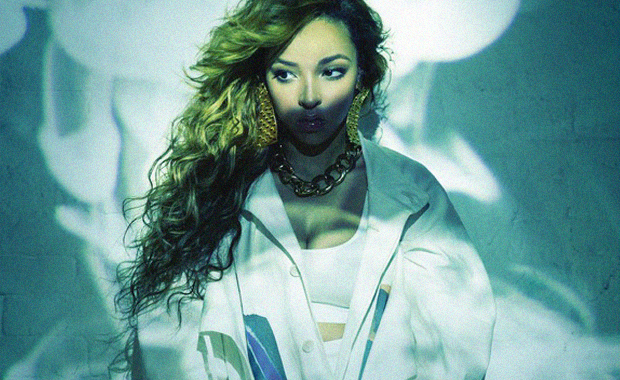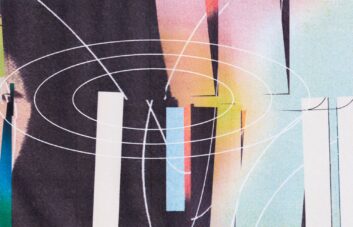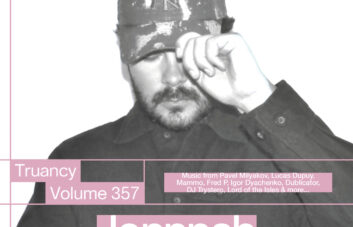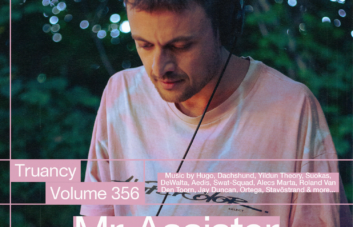The most common introduction we have to emerging artists is a process of gradual budding. We see artists stumble through mixtapes of exploration and hesitation before they finally grasp a wholesome and comfortable identity for their debut effort to be presented to the world, but this has never been a scenario that quite fit Tinashe Kachingwe. The Los Angeles native’s first official album Aquarius is set to release this October via RCA Records and anyone who is familiar with Tinashe in the slightest knows that her body of work is already a force to be reckoned with. At twenty-one, she’s put out three bold mixtapes fueled by an air of casual confidence that’s unique for rising musicians today. Armed with skills of self-production and heightened level-headedness, all of Tinashe’s mixtapes are individually sharp creative statements that still haven’t lost their flair with time.
It isn’t only her solid discography and experience in production that set her apart. Tinashe’s music is a perfect representation of a new age wherein music is wonderfully unrestricted. Rather than a confinement of familiar genres, it’s evolved contemporary music that successfully incorporates elements from a myriad of burgeoning sounds, with vocally strong R&B being at the forefront of inspiration. Tinashe is a new type of artist that is self-reliant and knows exactly what she wants her music to sound like. As a result, her output sounds genuine, well-thought-out and keeps up with the times at any rate. Aquarius is one of the most cohesive and powerful pop debuts to hit shelves in years and acts as a worthy inauguration of Tinashe’s promising career in years to come. We had the delightful opportunity to speak to Tinashe during her brief visit in Amsterdam and discussed Aquarius, its creative process and her plans for the future among other things.
Hi Tinashe! How have you been? Is this your first visit to Amsterdam? “Yes it is! It’s been fun so far. It’s just so different from America. It looks like Disneyland or like a set or something, but it’s real life. We’ve just been walking around and doing some touristy stuff here, we went to the coffee house and checked out the red light district. [laughs]” I actually think it’s so depressing there! “It is! But you kind of have to check it out and experience it first hand, you know?”
Of course. I just want to start off with some questions about your new album. I had the feeling that with all your past mixtapes they all each had their own distinct themes. I read you describe Black Water metaphorically as the silence before the storm before this fall’s album. Keeping that in mind, what do you think the main idea behind Aquarius is? “The main concept of Aquarius is that it’s supposed to be my debut to the world. It’s a metaphor for who I am as an artist. Black Water was the set-up for this and now Aquarius is supposed to represent Tinashe. The time is here, it’s a new era of music, it’s a new time of creativity.”
All of your previous mixtapes sound like they each really have an own thought process behind them. You seem to have a very clear image in mind of how you’ve wanted things to pan out so far. Do you consider yourself a well-thought-out artist, do you plan ahead a lot? “Oh yeah, thank you, definitely! Everything that I do is super strategic. I never just throw anything out there. Every step of the way I have reasoning behind why I do everything and I take it very seriously. I’ve been planning this kind of career for my whole life so I feel like everything is so important. So yeah, you’re right, it is very calculated. In a good way.”
How has it been recording this album for you? You made most of your mixtapes at home, so how has it been a different experience recording Aquarius, collaborating with bigger established producers? “Like you said I’ve been so accustomed to making everything on my own in my room. At first it was definitely a growing and learning process for me to learn how to collaborate with other people with an artistic opinion. To be able to get my ideas across and still feel like I was being true to myself while still working with other people. Because of that, the beginning of the album process was a little slower, but then I really got more into it and became a lot more comfortable. Now, I definitely feel like I have so many songs that really represent who I am. I have too many songs, honestly. I’ve recorded over 150! [laughs] So that’s a lot. The selections have all been made though, so they’re getting mixed and mastered right now. It’s been exciting and now I’m really ready to just get it out. The album has been in the works for so long, I’ve been working on this since the beginning of 2013, so that’s a solid year and a half. It’s just going to be such a relief releasing it.”
I just heard the new track that dropped as well, “Pretend” with A$AP Rocky. so it feels a lot closer! That’s a Detail production right? “Yeah! Detail produced it and he’s pretty crazy. I will not lie. Of all the people I’ve worked with he’s definitely one of the more far out ones. I don’t know how else to describe it other than that he’s just a weird dude. He says crazy things, he acts crazy, he dresses crazy and he’s just quirky, but a lot of the times those are the people who creatively have a cooler perspective. It was definitely cool to work with him.”
How did most of the recording take place on your collaborations, did you actually get together to work on the tracks or was it more like a sending back and forth kind of thing? “It kinda depended on the song and the producer. Some producers really prefer to work face-to-face while others prefer to have their beats already made and then send them to you. In those situations I like to be able to take them home and record my own song, on my own time in my home studio still, because of that comfort and vibe. I’ve just gotten so used to that. So yeah, it depends on the producer. Sometimes they sent them back and forth, like Boi-1Da. He was one of the producers that would always send me beats and I would record at my own house.” What was it like to work with Boi-1Da? “Boi-1da is amazing. He’s a really sweet guy and he’s one of my favourite producers. I think everything he puts out is dope and stuff that I’m into. My taste just really gravitates towards his beats, he’s one of my favourites.”
There’s been a lot of talk of genre labelling with your music. You’ve addressed this in your Dazed interview as you said you don’t believe in either just pop, R&B or indie, but believe in a medium. The teaser you put out for the album definitely shows the more dark side of your art compared to for example “2 On“. Do you feel like you’ve established a happy medium with the album? “For me, definitely, I’ve established a happy medium. Maybe it does make it harder for people to understand my music because they can’t group it into a box. It’s not totally mainstream or totally indie, I do kind of bridge that gap. But I never feel pressured to be one thing or another, I like the fact that I can put out a song like “2 On” and then I can drop something that’s totally weird. People can think it’s the weirdest thing they’ve ever seen. I think that’s cool, you know? To make people uncomfortable and push their limits of comfort. People can get too comfortable with standards and labels.”
Totally. But you did mention that you’re quite strategic just now. So do you put a lot of thought into it in terms of trying not to make audiences too uncomfortable? “Hmm… I kind of just let it happen and see how it goes. In general my music does come full circle, so they’re never going to get too uncomfortable. Because for example, in interviews it’s not like I act like a crazy person. I’m pretty straight forward and down to earth so people can still look at that and think that I’ve got an interesting creative perspective. At the same time, I’m not trying to be someone that I’m not. At the end of the day, I don’t think that people think I’m nuts. But that’s cool too though! [laughs]”
What has been the most enjoyable song to work on for Aquarius? “My favourite experiences of recording are done in my own time and in my own zone. I still really love to record music in my bedroom home studio. So I think some of my favourite songs were recorded there, but of the songs that I did in major studios I would say “How Many Times”, which is a song that I recorded with Future in Atlanta. That was probably one of my favourite song recording experiences. We went to Atlanta, hung out with Future, we were in the studio and it was a whole collaborative experience. It was just fun, a lot of positive energy, he was really funny and he told a lot of jokes. He was light-hearted and he figuratively wore an American flag jumpsuit kinda thing. He’s a great personality so it was a cool experience.”
Considering everything you’ve gone through recording this album, what have you learned from the process and how has it shaped your outlook for recording your next album? “In the beginning of the process I definitely got caught up in the thought of working with all these amazing producers that I felt like I have to do it in these studios and in those environments. But like I said, at the end of the day, I came back to the same conclusion that when I’m able to zone out and take it into my own space and really be personal with it, that’s when I get the best stuff. So I think going into my next album, I won’t want to even be putting myself into such random studio environments. I think I’ll try to keep it more condensed and controlled, with less people involved. I also know which producers I work really well with now, whom I have chemistry with. I don’t have to work with people that I don’t gel with right off the bat, you know?”
I also wanted to touch upon your own productions for a bit, as you produced most of your previous work yourself. Do you feel like the fact that you have so much experience producing yourself has influenced how you collaborated with other producers? “Yeah definitely. It depends on the producer how it works out. Some people are maybe a little thrown off slash low key intimidated by the fact that I know what they’re doing. I’m very particular and I’m a perfectionist, so I’m very specific and I’ll let them know if something doesn’t sound right. I notice seemingly really miniscule things. To me they stand out, while to others maybe they wouldn’t. I think some producers aren’t necessarily used to people noticing those types of things. For some people that’s a negative thing, because they’re kind of intimidated or weirded out. They don’t expect me to have this whole perspective. Some people think it’s really cool though. They think it’s dope that I know what I’m doing, so it really just depends on who I’m working with for sure.”
Do you feel like working with so many big producers has changed how you as a producer look at your creative process? “Yeah! I think it has definitely pushed me to want to be better. It’s always inspiration and you learn a lot of little tips and tricks that different producers use. Just different strategies and methodologies to go about producing your songs. To know that kind of inside information, that affects the way that you create music.” What do you enjoy the most about producing yourself? “At the end of the day, I enjoy never having to rely on other people to create my art for me. I like to be able to know that I can still do it myself. I can still make stuff that sounds dope and not have to feel like it’s not going to be good. That’s my favourite part about being able to have these skills.”
What type of music and producers have influenced the most, in terms of production? “Production-wise, James Blake a lot. SBTRKT was a huge one too, still to this day I love his production in how it’s very unique and different. And then just a lot of the hip-hop guys as well, people that I have actually ended up working with like Boi-1Da, T-Minus and MikeWiLL. People who I’ve always admired and then to actually work with them is always fun.”
Lyrics-wise, a lot of your songs have a very strong theme of dealing with negativity, confidence in yourself and your unpredictability as an artist. I think your Drake cover was a good example of that. Even though you have a lot of experience in the industry with your acting background, what would you say is your biggest struggle as a musician who is yet to really emerge? “It’s dealing with people who don’t take you seriously, for whatever reason. Whether it be because they just think I’m a cute girl and they don’t think I have a perspective. Maybe they think that I’m young, so they think I don’t know what I’m talking about. Or they think that it’s just a label-manufactured product and that I’m not a real artist. This is is something that I’ve been working on for a really long time, so when people don’t really take the time to understand that, when they just come and take it for granted, that’s frustrating, for sure. Of all things, that’s probably the most difficult thing to deal with. But I feel like people understand that more as they get to know me as an artist. But as “2 On” is my only official single, sometimes people think that’s the only song I have. That is not true at all. [laughs]” I guess it’s also extra difficult because “2 On” is much more radio-oriented than your other tracks as well. “Yeah, so people take that sometimes and they’re like ‘Oh, so this is Tinashe!’ but then I’m like.. really, you don’t know. Get to know, do your research!”
What are some things that inspire you to write, outside of music and your own life experiences? “I’m really inspired by nature, so when I go places that are really beautiful I feel very inspired. There’s something about that that brings out emotion in me. Like you said, life experience and other music, but then different types of art in general as well. Architecture, fashion, movies, painting, all that stuff is where I try to get inspiration from.”
You’ve been in the entertainment industry for a really long time as you’ve been in acting before this. What has your acting career taught you that you still use today as a musician? “What it taught me when I was growing up is that rejection isn’t the end of the world. People will reject you and it’s not personal. You have to continue to push. When you’re a kid and you’re going to auditions all the time and they don’t book you for things, you just realize that you didn’t get it but that it doesn’t mean that this is over. It’s not the end and I’m going to keep going. I think that’s a valuable life lesson, that when you hit road blocks or when things are seemingly bad, that doesn’t necessarily mean that things are as bad as they seem.”
You left acting to focus on music. Still, I saw in an interview that you still intend to pick up acting again after this. Why did you choose to focus on music first? “Music has always been my biggest passion at the end of the day. I really wanted people to know that music is something that I take very seriously. I didn’t want them to get confused and think that I’m an actress who’s just doing music for fun or a girl that’s just trying it out to see if it would work. It’s very important to me, so I wanted people to get to know me as Tinashe the music artist before I started doing all the other stuff.”
I read somewhere that your dad was a stage actor and that that’s how you got into acting. How has having a dad in the performing arts affected you? “He always encouraged me to be in front of people. He always encouraged me to sing in the house. My parents never told me that pursuing entertainment was a bad idea, they never tried to dissuade me from pursuing my dreams. For that reason I’m very grateful to my parents.”
What type of music did you grow up with at home? “We listened to a lot of 90s R&B like Janet Jackson, Michael Jackson, Sade, Boyz II Men, Tony! Toni! Toné!, Whitney Houston, Mariah Carey, stuff like that was always playing in the house.” And what was your first memory of being in touch with music that really made you want to pursue it? “When I was really young, I loved Christina Aguilera. She was my hero as a kid. So I think the first time I went to a concert it was Christina Aguilera and to see a stadium show, that energy, to hear all those screaming people, just the whole show, that’s when I thought to myself ‘Okay, I can’t wait for that to be me! This is definitely happening!’ [laughs]”.
You’ve definitely been through a lot in the industry for your age. With all that you’ve experienced, how would you define success for yourself as an artist? “I definitely feel like there’s levels of successfulness. I do feel like I’m successful already with the level that I’m at, but I don’t think that I’ve reached the level of success that would fulfill me just yet. I have a long way to go with what I want to achieve. That being said, I feel like true success is just being very comfortable with where you are and not feeling like you could have done something more. That you’ve really achieved what you’ve worked for.” And do you feel like you are successful in that sense? “I do feel like I am, yeah. I feel like I’ve achieved a lot of goals that I’ve set for myself. But I have so many more goals. Yes, I’ve hit level one of success, but I have like twenty-five more to hit. I have very high expectations and we’re getting there. We’re building. It’s a building process.”
Where do you see yourself in three years? “In three years, I hope to obviously have a couple of albums out. I’ll be having my own tours of the world at that point, where I can sell out giant shows for people everywhere and they’ll expect me to be around for a while. People will know that I’m a legitimate force to be reckoned with in the music industry.”
Tinashe’s debut album Aquarius is out on October the 22nd via RCA Records.




